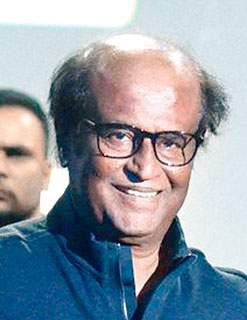
Apart from featuring together in the credits of 2.0, as the sequel to Robot is officially titled, Rajinikanth and Akshay Kumar share an unabashed love for big money. Akshay’s pursuit of lucre has been well-chronicled over the years while Rajinikanth told me years ago, “If I had not become an actor, I would have been a smuggler. I wanted lots of money. Luckily, I
became an actor.”
Fortunately, Rajini and Akshay saw success and uncountable money in a profession that endeared them to their country. And their admiration for big money continues.
Rajini’s close friend and Sun TV owner, Kalanithi Maran, who funded Robot, made headlines for alleged money-laundering and the 2G scam. Although Rajini kept his own nose clean, he admired Maran for his business acumen and was grateful to him for having pulled out the stops for Robot. “What a producer!” Rajini had exclaimed in admiration.
Is it a coincidence that where there’s astounding funding, there’s something financially dodgy going on? The doubt arises
because the focus today may be on Rajini, Akshay, director Shankar and composer A.R. Rahman as the pillars of Lyca Productions’ 2.0. But behind this Rs 350 crore 2017 release is a UK businessman of Sri Lankan origin. Google the name Subaskaran Allirajah for an introduction to one of the richest men of the UK. He’s in his 40s, he’s the brain behind Lycamobile, the multinational telecom giant, and he’s worth £ 160 million.
That is the nice part. Read the fine print and Subaskaran, the producer who shared the stage with Rajini, Akshay and Rahman at last week’s Mumbai media meet of 2.0, has allegations as long as a film script. There was some sort of financial controversy during Subaskaran’s earlier Tamil film Kaththi Too, but it was wall-papered pretty neatly. Interestingly, Kaththi which Murugadoss directed, had also starred a villain from Hindi films, Neil Nitin Mukesh, while 2.0 has Akshay as the main antagonist.
To return to the man who has bankrolled 2.0, his write-ups on the Net strangely make no reference to his religion. In fact, religion has been pointedly struck out on one site. I really wonder why.
Alleged to be close to former Sri Lankan President Mahinda Rajapaksa, Subaskaran’s offices were raided by the French authorities this year. With financial gifts of £ 2.2 million to the Tories, he’s known to be one of the biggest donors to former Prime Minister David Cameron’s Conservative Party. There was an enquiry when Cameron thereafter pledged a £6 million aid to Sri Lanka with allegations that most of it went to North Lanka, Subaskaran’s place of origin.
There have been serious and consistent allegations of money-laundering, embezzlement and shell companies. There have been investigations into the “rucksacks full of” cash deposits of huge six-figure amounts by his employees into various branches of the Post Office in England and Subaskaran’s use of Madeira as a tax haven. His own auditors found the “unorthodox” cash deposits and complex corporate network “worrying”.
In short, big money with all its connotations is behind the budget of 3.5 billion. It makes 2.0 the most expensive Indian film made so far (even Bahubali has a more modest figure of 2.5 billion). It just may turn out to be the most controversial funding too, in recent times. A passing thought: perhaps an unedited story on Subaskaran’s life would make an
engrossing script, a UK-Sri Lankan version of the Wall Street series.
Talking of money, demonetisation is the new culprit named by producers for the failure of their films. While that may have affected ticket sales to an extent, a currency crunch can hardly be blamed for the utter failure of films like Farhan Akhtar’s Rock On 2. The truth is, even when there was a private screening at Yash Raj Studios, a weekly Saturday night affair where Pam Chopra invites her dear and near ones for dinner and a film, hardly a handful turned up to watch Rock On 2. If there were few takers for a free film topped with warm Chopra hospitality, it definitely had nothing to do with demonetisation. But surprisingly, the losers are not Farhan and partner Ritesh Sidhwani who made their Rock On sequel on a tight budget. Riding on what was perceived as a hit franchise, the canny businessmen then sold the film to Eros International for a whopping Rs 40+ cr, making a huge profit on the table. Wherever you turn, the focus remains on big money.
Bharathi S. Pradhan is a senior journalist and author










